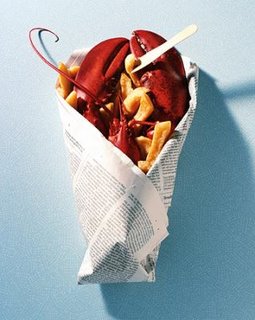 Ayr, west coast of Scotland, Saturday night. A giant claw knocks on the front door. It belongs to a fresh lobster that my dad's mate, Dredger, caught that day. Dredger's an ordinary fisherman but catches some of the world's best shellfish you can find - so good it finds its way into restaurants in London, Paris and Barcelona - and even Manhattan. And he's brought round a freshly snared lobster. He's the Santa of the sea.
Ayr, west coast of Scotland, Saturday night. A giant claw knocks on the front door. It belongs to a fresh lobster that my dad's mate, Dredger, caught that day. Dredger's an ordinary fisherman but catches some of the world's best shellfish you can find - so good it finds its way into restaurants in London, Paris and Barcelona - and even Manhattan. And he's brought round a freshly snared lobster. He's the Santa of the sea. But what to do? I've never cooked one of these monsters before. I've got recipe books - like one of Gordon Ramsay 's - but they all seem to be super-fancy recipes. Whereas I want it as simple as possible - why spoil something so fresh and tasty with other flavours?
So I just do the simple thing: boil it in court buillon and serve it with a simple garlic mayo dip and home made oven chips made from Ayrshire potatoes. Wash it down with a local ale. Simple. Superb. And totally local. Everything consumed came from within 10 miles. No-one else in the family wanted to share the spoils, though - my poor sister even screamed when she saw the lobster in the kitchen sink. I don't blame them for not wanting to eat such amazing food but sadly this is the attitude of many Scots. And thats why, even with one of the world's best natural larders - the finest shell fish, salmon, osyters, mussels, venison, beef, lamb, gorgeous vegetables, beautiful fruit - the country has one of the worst diets in the 'first' world. A diet which has helped earn the west coast of Scotland the unenviable reputation as the world's heart attack capital. The country fails to embrace its best assets.
Worse, despite many Scots failing to really embrace their country's amazing edible assets, many natural food resources are on the brink of disaster. Dredger told me the Ayrshire's fishing fleet stands at a mere 19 boats, almost all sailing from Troon. The Ayr port has long since shut down and nearby Girvan is waning. The fish stocks in the area are all but gone - fished out. Indeed, the prawn industry is keeping what's left of the local fishing industry afloat. But with a decimated eco-system, how long before these prized catches go the way of North Atlantic and North Sea cod stocks?
My strategic solution is this, for what it's worth:
- A national campaign spear-headed by HEBS (Health Education Board Scotland) to change the country's eating culture - link with key media partners - promote Scottish food, local, natural food - campaign for healthy eating in the school, the workplace and the home
- Curb fishing in areas where stocks are at perilously low levels - create and manage protected marine and animal parks that have proived so successful around the world, such as Australia, Sardinia or closer to home in Northern Ireland
- Promote leisure and tourism in marine and animal parks - e.g. seal and whale watching trips and sports activities like Sailing and diving - the climate may seem at certain times of the year an anoyance, but not totally prohbitive


No comments:
Post a Comment